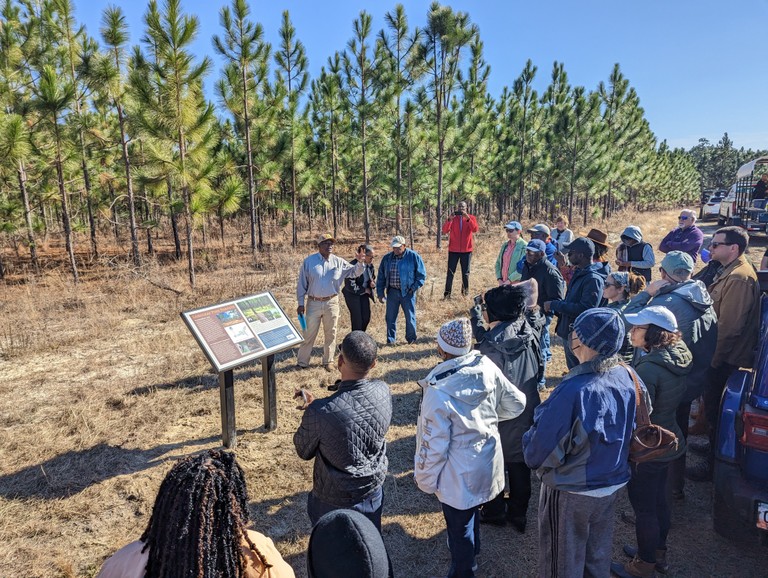Updates & Blog
Learning Together: Minority Landowners Empowering One Another in Caring for Their Lands

To wrap up Black History Month 2023, we are celebrating the work being done to increase minority participation in forestland management and help landowners reap the economic, ecological and cultural benefits of owning forested land.
Meet Herbert Hodges, an African American forest landowner who recently opened his property to 40 underserved landowners to learn more about land management practices. Hodges, who was recognized as the 2022 Gjerstad/Johnston Landowner of the Year for his dedication to longleaf ecosystem conservation, hosted the first Longleaf and the Landowner Academy, a three-day educational event on his 600-acre farm in Emanuel County, Georgia. The event, held in January, was sponsored by the Longleaf for All working group, a new initiative which advocates for and supports minority and underserved landowners and forestry professionals. The event was also attended by representatives from the Longleaf Alliance, National Wildlife Federation, U.S. Department of Agriculture, Forest Service, the Georgia Forestry Commission and other organizations.
The Hodges family has owned the farm since the 1880s. While Hodges comes from a long line of farmers, he has spent the past decade restoring habitats across the property, known as the Willie Hodges Estate Farm. With help from foresters in the Natural Resource Conservation Service (NRCS) and Georgia Forestry Commission, he has transformed 400 acres of his land into a pristine longleaf ecosystem. Now, he hopes to encourage others to join the effort and educate landowners on his successful practices.
“My second profession was education. I believe when people learn better, they will do better. I wanted to talk to minority landowners and inform them there are things they can do to manage the property when they’re not actively using the land.”

Landowners heard from a range of speakers. Scientists, foresters and nonprofit coordinators from ten different organizations and government agencies discussed topics such as longleaf pine planting techniques, wildlife habitat management and prescribed burns.
Participants also got an up-close look at Hodges’ restoration projects. During tours of the Willie Hodges Estate Farm, landowners learned about the ecology of pine savannas and common mistakes landowners might make during habitat restoration. They also observed the unparalleled biodiversity of a restored longleaf ecosystem.
“After twelve years of restoration, the wildlife has returned. I see many more turkeys and fox squirrels–and there are definitely more gopher tortoises. After restoration, they picked up their suitcases and moved on in. I don’t know where they came from…they weren’t there when we were planting,” said Hodges.
In addition to teaching land practices, the event also centered on a historical discussion of Black land loss and obstacles faced by minority landowners. Speakers explained how, in the 20th century, thousands of black landowners and farmers were forced to relinquish their land and farms. Experts estimate Black landowners lost 326 billion dollars in land, largely as a result of discriminatory government subsidy and lending policies. In the south alone, Black landowners lost nearly 12 million acres.
Amadou Diop, an Outreach Liaison with the Forest Service and speaker at the event, emphasized the importance of reconciling relationships between minority landowners and the government. Diop mentioned that federal programs like the Forest Stewardship Program, which currently assists hundreds of minority landowners, are key to supporting and helping minorities improve the quality, productivity and economic value of their land.
While minority landowners continue to feel the effects of 20th-century policies, efforts such as the Longleaf and the Landowner Academy are helping people find cost-sharing programs, obtain valuable knowledge, and foster a community and support system of dedicated individuals.
Toward the end of the three-day event, one landowner and attendee commented, “The information received and the people that I met are priceless. My mind is racing over all the information of what we can do with [our] land and the steps we need to take now. I can’t begin to express my gratitude for this program.”

It was also a transformative experience for the speakers and professionals involved. Tiffany Woods, the Southeast Director of the Private Lands Forestry Program for the National Wildlife Federation and speaker at the event, called it the “most energizing and meaningful educational experience many of us, both professionals and fellow landowners, have attended in the longleaf and forestry fields.” Woods stated that the personal anecdotes, tailored curriculum and relationships forged with other landowners made it unforgettable.
Because of the overwhelming positive feedback, Woods and other members of the Longleaf for All working group are already planning more sessions.
“Since holding this inaugural academy in partnership with Longleaf for All, we have received a handful of requests to expand this educational workshop to more Southeastern states, which we look forward to doing in the future,” said Woods.
To find out more about the Longleaf for All initiative and future events, check out AmericasLongleaf.org/Longleaf-for-All. For Information on getting a low or no-cost forest management plan through the Forest Stewardship Program, contact your local state forestry agency.